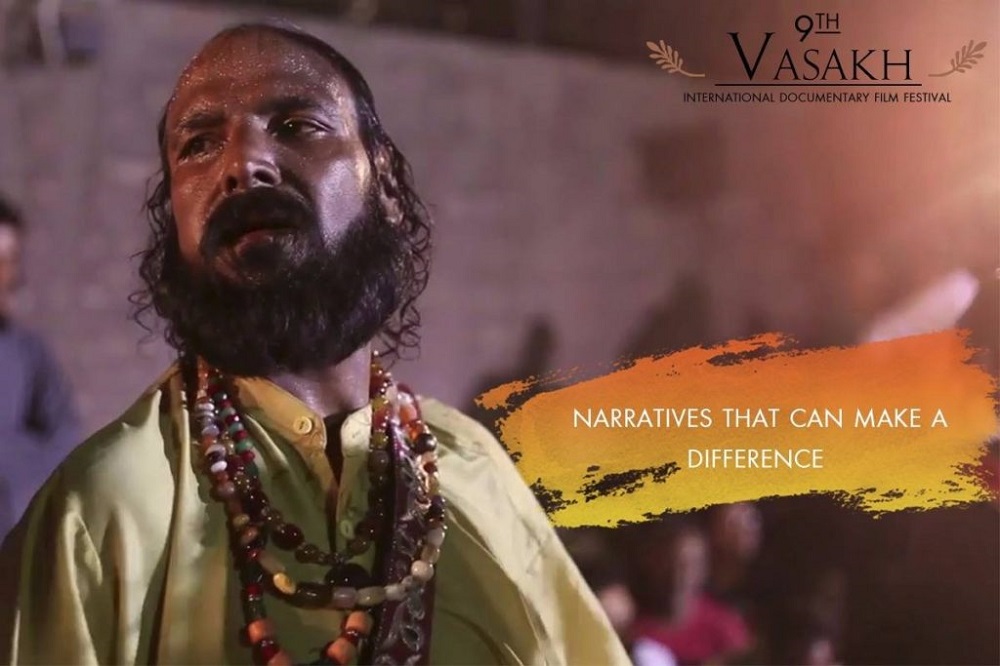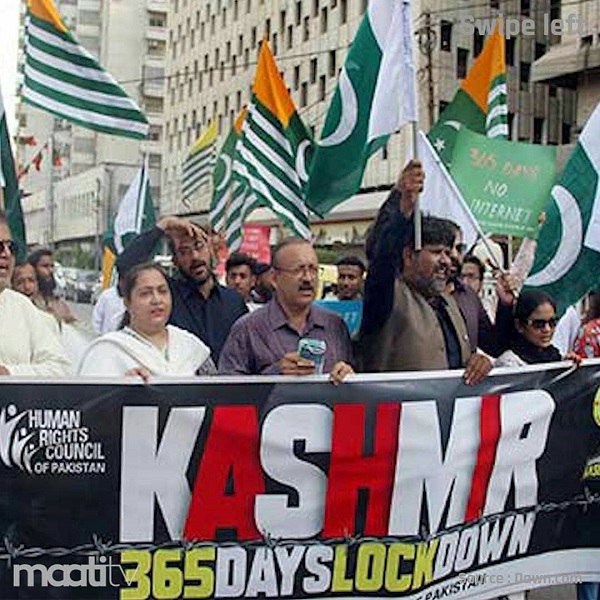Written by: Nida Qasim
Posted on: April 12, 2022 |  | 中文
| 中文
Maati TV correspondent recording a video in a village
Maati TV is collaborating with the Smithsonian Institution and various international visual storytellers to bring us virtual storytelling workshops this summer. Maati TV is Pakistan’s first web-based interactive channel and a product of the Interactive Resource Center (IRC), with Risham Waseem as its director. Initially launched in 2011, the platform took a complete turn in 2016 to accommodate the digital millennial vision. Its content is centered on the themes of human rights, democracy and culture, and the platform boasts a diverse audience that actively engages with the content it produces. The work done at Maati TV strives to present an image of Pakistan that promotes peace, coexistence and diversity, and aims to find narratives within Pakistan that promote multiculturalism and acceptance.
Other exciting projects done at Maati TV include Karachi Storytelling Network for Peace, Maati TV Theater & Varsakh Film Festival. The Karachi Storytelling Network for Peace project was a 7-month project where 80 university students in Karachi were given workshops on peacebuilding and digital storytelling by the IRC team, and well-known documentary filmmakers from Pakistan. The students collaborated to create 16 short films that highlighted the themes of peacebuilding, tolerance and acceptance within their university campuses and communities, which are now exhibited on Maati TV’s social media pages and on a new social media platform called “Karachi storytelling network for peace”. In January this year, Maati TV and the IRC hosted the 14th Virtual Varsakh Film Festival, a one-day virtual documentary film festival, which shared untold stories from across Pakistan, featuring narratives about climate change, cultural diversity, youth issues amongst others. Maati TV also does an interactive form of theater that tries to highlight the themes of civic engagement, human and women’s rights, education, religious minorities and many others. These digital theater plays can be seen on Maati TV’s website, as well as on their Youtube and social media channels.

'Narratives That Can Make A Difference', a film screened at the 9th Vasakh International Documentary Film Festival
Maati TV’s filmmaking and storytelling workshops are free, and will be given by a wide panel of local and international speakers over Zoom. They start in April and go all the way into July, covering various key subjects such as the art of acting, how to use the camera, representation in documentary filmmaking, content creation on social justice issues, scriptwriting and much more. They will also feature various film screenings by acclaimed filmmakers, and interactive workshops on storytelling for social change. The workshops offered by the Smithsonian institute will cover topics on interpreting and archiving films for community access, ethnographic filmmaking and storytelling in museum exhibits etc.

A rally in solidarity with the people of Kashmir, organized by Human Rights Council of Pakistan and Maati TV
The panel of speakers is a vibrant and extensive one, but I’ll mention some names among them: Naeema Butt, the actor known for her performance in the HUM TV drama Ehd-e-Wafa, with 10 years of experience in human rights activism through theatre, films, drama and journalism. She did a live screening of her short film, ‘The Guest House’, at the first workshop of this series. Her upcoming workshops include Acting with the mind, body, and heart and How to tell real stories for social change / what’s your story?
Haya Fatima Iqbal, an Academy and two-time Emmy-winning documentary filmmaker from Pakistan, who has covered a range of subjects through her documentary work, from gender, militancy and conflict to climate change, water scarcity and social justice. Her work has been featured in a HBO (Home Box Office) Documentary, BBC, Al Jazeera, Channel 4 UK, VICE, National Geographic Society, Redfish, the Thomson Reuters Foundation and other media organizations. Her upcoming workshop is on How to be Empathetic Storytellers.
Shahrukh Naveed, the founder of Filmoclock Production Studio with 14 years of experience in the field as director, writer and cinematographer. His recent project is a well-acknowledged short film, “Half-Cooked,” starring Humaima Malick and Mikaal Zulfiqar, which he will be screening in his upcoming workshop, Screening of "Half-Cooked" & Meet the Filmmaker TalkBack. His other workshops include Using the Camera as the Storyteller, and Script Writing: How to Write a Film Character and Dialogues.
Tazeen Bari, a documentary director, producer and cinematographer based in Pakistan. Her documentary films include Letters From Death Row (acquired by Al Jazeera for Witness), Vote For X, Qandeel and Matkay Pay Thappa: An Election Story. Her upcoming workshop is on Representation in Documentary Filmmaking and the Power of People Telling Their Own Stories.
Paul Michael Taylor, a research anthropologist at the Smithsonian Institution since 1981, is a curator for Asia, Europe and the Middle East at the Smithsonian’s Anthropology Department, and he serves as Director of the Smithsonian’s Asian Cultural History Program. His upcoming workshops include Introduction to Ethnographic Film and Storytelling in Museum Exhibits.
The workshops are all to be conducted online via Zoom, are free of charge, and you can register for the workshops of your choice using the link below:
https://sites.google.com/view/filmworkshopsirc/registration
You can learn more about Maati TV’s work and stay updated via these links:
Maati TV's Website
Maati TV's Facebook Page
Maati TV's Youtube Channel
Maati TV Twitter Page
Maati TV Instagram Page
You may also like: